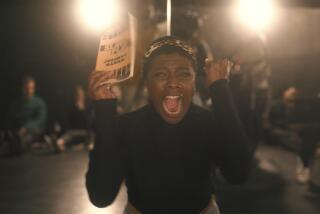Death can’t end his flow of words
- Share via
NEW YORK — Jazz, naturally, thumped through the dimly lighted room where a few hundred people gathered Monday night for a reading and discussion of Jack Kerouac’s newly released work. But this was no smoky cafe where disaffected beatniks swapped philosophy through free-form verse; it was a marble hall in the New York Public Library filled with elegant patrons sipping white wine.
Regarded as an icon of the counterculture when he died in 1969, Kerouac now holds an unquestioned place in the American canon as one of the country’s most influential writers. A key member of the Beat Generation, he used spontaneous, syncopated language to challenge the constraints of post-World War II America.
Now his first play has been published. “Beat Generation” -- written in 1957, the same year “On the Road” was released -- was initially rejected by producers and sat moldering for decades in a New Jersey warehouse that stores the writer’s files. Kerouac’s longtime literary agent, Sterling Lord, rediscovered it last year as he was doing research for a book he’s writing. The play was published this month by Thunder’s Mouth Press.
The work has already gotten Hollywood’s attention. On Monday, actor and library supporter Ethan Hawke -- who was born a year after Kerouac’s death -- did a reading of a scene from the play with two friends.
Kerouac “made it cool to be a thinking, thoughtful person seeking spiritual existence, which is what we need,” said Hawke, whose red plaid shirt and blue jeans stood out in the sea of black attire.
When pressed afterward about how the author’s works had affected him, the actor was less effusive. “Any disillusioned youth feels influenced” by Kerouac, Hawke said warily, regarding a reporter with a suspicion honed by numerous encounters with the tabloids.
Kerouac’s improvisational style still shapes American culture, he added, before edging away: “Whether it’s jazz, beat poetry or rap music, that’s what we do best: wing it.”
“Beat Generation” centers on a group of working-class men in New York pondering spirituality and the meaning of life between wine-drinking and horse-betting.
When he first read it, Lord “wasn’t that smitten with the play,” he admitted. “It wasn’t so exciting in those days because that play was about things happening all around us.”
Playwright Lillian Hellman turned down an offer to produce. Efforts to get actor Marlon Brando interested also went nowhere.
But now, “I think this play can have a very long life,” said Lord, who added that a New York production was in the works for the spring.
Along with Lord and Hawke, Kerouac devotee and author A.M. Homes and Harper’s magazine editor Lewis Lapham discussed the find in a panel billed as “Back on the Road: The Beat Generation in Vogue Again.” But the discourse was decidedly more academic than topical, a kind of Beat Generation 101.
“The way you define them as a group was their attempt to find the true American sound, the sound of the American voice, the American experience,” said Lapham, who knew many of the Beat authors. “One of the reasons today it continues to be inspirational is because so much of our current sound is TV, which is inauthentic, awful sound.”
Homes called the Beats “a response to conventional life and pushback against the man in the flannel suit,” adding that their influence could still be seen in art and style.
But she and the other participants had mixed feelings about whether a cultural rebel like Kerouac could survive in today’s world. “You can’t be a young writer or young artist and live in New York and starve, because it’s too expensive,” Homes noted.
What about the blogosphere, asked an audience member. Do online postings compare to the ream of butcher paper on which Kerouac famously dashed down his thoughts?
Homes didn’t think so. “That’s e-mailing,” she said.
Hawke cited rap music as a descendant of the Beat Generation. “That’s what Kerouac was doing, this poetry of the street,” he said. But the “marketing and packaging” of rap has diminished it, he added. “As soon as you start selling something, you somehow belittle it.”
Lapham said he still encountered plenty of young writers at Harper’s who shared Kerouac’s “hope of discovery of a world that hasn’t yet been sold for a mess of silver.”
But “everything is so quickly commodified,” he added afterward. “What starts out as an idea becomes a dress. It doesn’t take very long.”
More to Read
The biggest entertainment stories
Get our big stories about Hollywood, film, television, music, arts, culture and more right in your inbox as soon as they publish.
You may occasionally receive promotional content from the Los Angeles Times.










